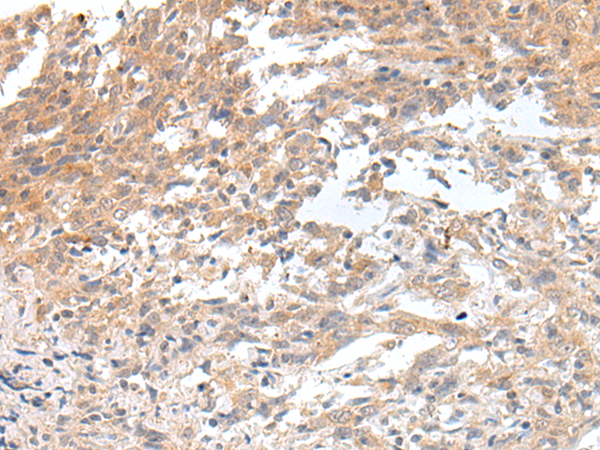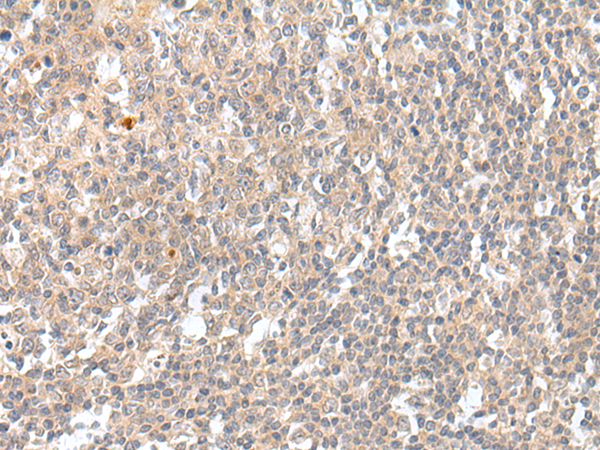

| WB | 咨询技术 | Human,Mouse,Rat |
| IF | 咨询技术 | Human,Mouse,Rat |
| IHC | 1/25-1/100 | Human,Mouse,Rat |
| ICC | 技术咨询 | Human,Mouse,Rat |
| FCM | 咨询技术 | Human,Mouse,Rat |
| Elisa | 1/5000-1/10000 | Human,Mouse,Rat |
| Aliases | GALN; GLNN; GMAP; GAL-GMAP |
| Host/Isotype | Rabbit IgG |
| Antibody Type | Primary antibody |
| Storage | Store at 4°C short term. Aliquot and store at -20°C long term. Avoid freeze/thaw cycles. |
| Species Reactivity | Human |
| Immunogen | Synthetic peptide of human GAL |
| Formulation | Purified antibody in PBS with 0.05% sodium azide and 50% glycerol. |
+ +
以下是关于GAL抗体的3篇参考文献及其摘要概括:
---
1. **文献名称**:*Anti-Gal: an abundant human natural antibody of multiple pathogeneses and clinical benefits*
**作者**:U. Galili
**摘要**:该综述探讨了人类抗Gal抗体的生物学特性及其在异种移植排斥中的作用。抗Gal抗体靶向α-1.3-半乳糖(α-Gal)表位,在猪器官移植到人体时引发超急性免疫排斥,同时也在病原体感染和自身免疫疾病中具有潜在影响。
2. **文献名称**:*The alpha-gal epitope and the anti-Gal antibody in xenotransplantation and in cancer immunotherapy*
**作者**:U. Galili 和 B. A. Macher
**摘要**:文章分析了α-Gal表位在猪组织中的表达以及抗Gal抗体在异种移植中的免疫屏障作用,同时探讨了利用该抗体增强癌症免疫治疗效果的策略,例如通过α-Gal修饰肿瘤疫苗激活免疫应答。
3. **文献名称**:*Delayed anaphylaxis to red meat associated with IgE antibodies specific for galactose-alpha-1.3-galactose (alpha-Gal)*
**作者**:S. P. Commins 等
**摘要**:本研究首次将红肉延迟过敏反应与抗α-Gal的IgE抗体联系起来,提出蜱虫叮咬可能诱导此类抗体产生,导致患者在摄入哺乳动物肉后数小时发生严重过敏,揭示了抗Gal抗体的病理学新机制。
---
这些文献涵盖了抗Gal抗体在异种移植、癌症免疫治疗及过敏性疾病中的关键研究。
**Background of GAL Antibodies**
GAL antibodies target the galactose-α-1.3-galactose (α-Gal) epitope, a carbohydrate structure expressed on cell surfaces of most non-primate mammals but absent in humans due to evolutionary inactivation of the *GGTA1* gene. Humans naturally produce anti-GAL antibodies (IgG, IgM, and IgE) as part of immune responses to environmental exposures, such as gut microbiota or consumption of red meat containing α-Gal.
These antibodies gained prominence due to their role in **xenotransplantation rejection**, where α-Gal on donor organs (e.g., from pigs) triggers hyperacute immune rejection in humans. Research into gene-edited *GGTA1*-knockout animals aims to mitigate this barrier.
Additionally, anti-GAL IgE antibodies are linked to **α-Gal syndrome**, a delayed allergic reaction to red meat, often initiated by tick bites (e.g., lone star tick). This syndrome highlights the interplay between environmental triggers and immune sensitization.
Beyond clinical implications, anti-GAL antibodies are explored in cancer immunotherapy and infectious disease research, as some pathogens exploit α-Gal mimicry for host invasion. Their dual role—as protective agents and mediators of pathology—underscores their significance in immunology and translational medicine.
×